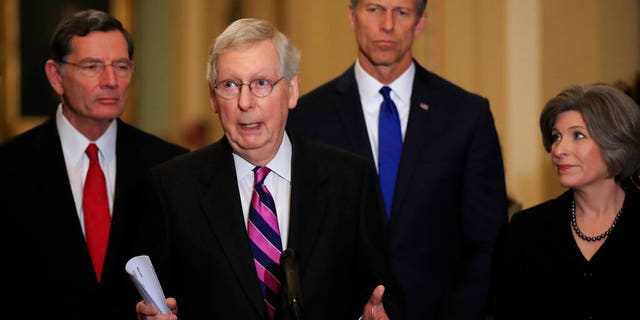The Senate on Tuesday confirmed President Trump's nominee to be a judge on the liberal 9th Circuit Court of Appeals
in a party-line vote -- and, in a historic snub, the White
House ignored the input of the judge's two Democratic home-state
senators in the process.
The aggressive and unprecedented move to
bypass the traditional "blue slip" consultation process and plow ahead
with the confirmation comes as the Trump administration seeks to
systematically erode left-wing dominance on the key appellate court,
which Trump has called "disgraceful" and politically biased.
With a
sprawling purview representing nine Western states, the appellate court
has long been a thorn in the side of the Trump White House, with
rulings against his travel ban policy and limits on funding to
"sanctuary cities." A lawsuit is currently pending before the 9th Circuit concerning Trump's emergency declaration over border security -- and Trump had sarcastically predicted that Democrats would purposefully file suit in the San Francisco-based appellate court to improve their odds.
The
new 9th Circuit judge, Seattle attorney Eric Miller, was confirmed
53-46. Miller was one the 51 federal judicial nominees left over from
the previous Congress whom the White House re-nominated last month.
Miller, currently the appellate chairman of the high-powered law firm Perkins Coie,
will replace Judge Richard Tallman, a Bill Clinton appointee who
assumed senior status March 2018. Miller is the fifth former clerk to
Associate Justice Clarence Thomas to be nominated by Trump to a federal
appellate court, including embattled D.C. Circuit Court of Appeals nominee Neomi Rao.
Miller
represented the government before the Supreme Court when he served from
2007 to 2012 as an Assistant to the Solicitor General of the United
States. He was also Deputy General Counsel of the Federal Communications
Commission.
Senate Majority Leader Mitch McConnell, R-Ky., with, from left,
Sens. John Barrasso, R-Wyo., McConnell, John Thune, R-S.D., and Joni
Ernst, R-Iowa, speakING to reporters on Capitol Hill in Washington,
Tuesday. (AP Photo/Manuel Balce Ceneta)
Among those objecting to Miller's nomination were
Washington State's two Democratic senators, Maria Cantwell and Patty
Murray. Aides say Miller's confirmation marks the first time the Senate
has strayed from tradition and confirmed a judicial nominee over the
dissent of both home-state senators.
“This is wrong. It is a
dangerous road for the Senate to go down,” Murray said Tuesday on the
Senate floor. “Confirming this 9th Circuit court nominee without the
consent or true input of both home-state senators, and after a sham
hearing, would be a dangerous first for this Senate.”
Miller was nominated last year but faced opposition from Democrats, in part over his views on issues of tribal sovereignty.
The
White House has previously signaled it will also plow ahead with other
9th Circuit nominations in other states without using the "blue slip"
consultation process. The Sacramento Bee reported
last year that White House officials had been negotiating with
California Sens. Dianne Feinstein and Kamala Harris about 9th Circuit
appointments, but the dialogue collapsed, and the White House proceeded
to announce three nominees over their objections.
Those nominees
-- Patrick Bumatay, Daniel Collins and Kenneth Kiyul Lee (all from the
Golden State, and reportedly all members of the conservative Federalist
Society) -- have yet to be confirmed.
GOP critics have branded the
court the “Nutty 9th,” in part because many of its rulings have been
overturned by the Supreme Court.
Last November, Chief Justice John
Roberts openly disputed Trump's comments that the nation has "Obama
judges" and partisan hacks on the courts. The move marked a highly
unusual challenge to the White House from a sitting Supreme Court
justice, and prompted some observers to accuse Roberts of naivete.
“What
we have is an extraordinary group of dedicated judges doing their level
best to do equal right to those appearing before them,” Roberts said in
the head-turning statement.
But Trump, invoking the 9th Circuit, fired back immediately.
“Sorry
Chief Justice John Roberts, but you do indeed have ‘Obama judges,’ and
they have a much different point of view than the people who are charged
with the safety of our country,” Trump tweeted.
“It would be
great if the 9th Circuit was indeed an ‘independent judiciary,’ but if
it is why are so many opposing view (on Border and Safety) cases filed
there, and why are a vast number of those cases overturned,” Trump
continued. “Please study the numbers, they are shocking. We need
protection and security - these rulings are making our country unsafe!
Very dangerous and unwise!”
















